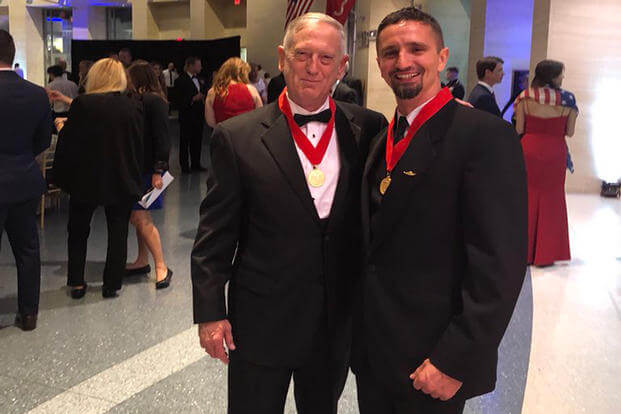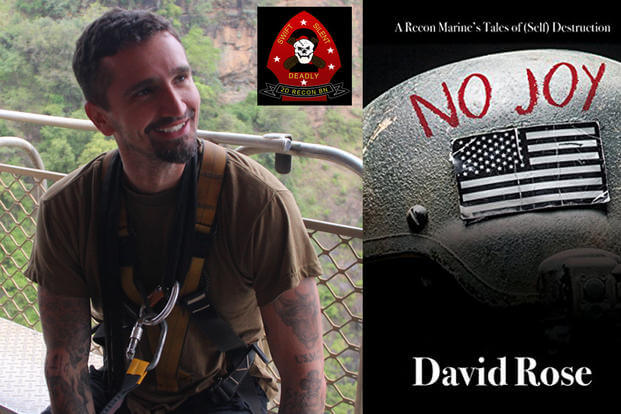David Rose joined the Marines to fight. He didn't want to sit on the sidelines and watch from afar. He got what he wished for and then some.
Rose served with the 2nd Reconnaissance Battalion and saw hellish battle in the second Battle of Fallujah -- code-named Operation Al-Fajr (Arabic for "the dawn") and Operation Phantom Fury. It was a joint American, Iraqi and British offensive in November and December 2004 and considered the highest point of conflict in Fallujah during the Iraq War.
The U.S. military called it "some of the heaviest urban combat U.S. Marines have been involved in since the Battle of Huế City in Vietnam in 1968."

Rose spoke candidly with Military.com's Sean Mclain Brown about his life as a recon Marine, his transition out of the Marine Corps and his journey to becoming a published author.
Q.: Tell us a little bit about the book tour you're currently on and how people can learn more.
A.: "The Verses and Curses Tour! Starts Memorial Day in Manhattan. First of its kind for me. Always wanted to be in a punk band; guess this is as close as it gets for someone who can't play an instrument to save their life.
"But yeah, myself and two other [Global War on Terrorism] guys, who seem to share my obsession with getting published, are setting out on a guerrilla-style tour of the East Coast. Other than tooling around in an RV, we will be reading from our collective works and signing said works for those wanting to wobble home with a copy.
"What we are ultimately hoping for is to see others come and share their work. I get that a lot; messages from inspired vets who want my opinion about an essay or a vignette ... well, we figured let's provide a platform for this. For those who may be interested in these slam nights, there is always our day's obligatory social media, but I'd also recommend they go on www.versesandcursestour.com. Dates, authors, locations, you name it."
Q.: Tell us a little about why you joined the Marines and later applied to Force Recon.
A.: "When I was 19, I was the poster child for the directionless. Just so happened I was a poster child living so close to Coronado Bay [in California] that I could see elements of the I [Marine Expeditionary Force] training. This was early 2002 and war was in the air, and with it, came this ... direction.
"Looking back, I wanted positive male role models and purpose and all the things that made me like so many young men. Only real difference was a penchant for misery; hence, pushing to Recon as soon as I learned it existed. Eventually, I'd be a Recon Marine in Iraq during the era of Operation Phantom Fury."
Q.: Can you share an anecdote from your time in recon that sums up what your experiences were like?
A.: "Well, I should probably clarify, I was a battalion recon man. I was technically in 3rd Force Co for like a month back in 2009 on volunteer reserve orders, but more time was probably spent driving from Orlando to Mobile and back than actually being in a Marine Corps uniform. At any rate: Battalion, Force or what-have-you, no, I really can't.
"I have just typed and erased the intro to maybe half a dozen stories and realized each time that being in Recon was so diverse that no one story can encapsulate the highs and lows, the sense of family, the sense of failure being worse than death and how it is populated by a group of men with such hilarious yet dire personalities."
Q.: What was your transition like? What would you have liked to know before you transitioned out?
A.: "A train wreck, just slow and with a series of bad girlfriends. I had no clue what I wanted to do when I got out. There are a few tidbits about the VA and the usual suspects that could have saved me some time and heartache, but the things I would have really liked to have known are the things that only come with time and maturity.
"Losing an identity, forging a new one, forgiving the world for not having stopped just because you put yourself in harm's way, there is no class for [these things]. Time really is the best teacher, for those of us anyway who give her rather indifferent voice a willing ear."
Q.: Tell us a little about your journey from Force Recon to author. I mean, you certainly buck stereotypes about Marines, which is great, but how did your career as a writer begin?
A.: "You're going to hate me because this is going to sound way too crystal-hugging, head in the clouds, but I believe maybe one or two elements in our makeup is just a 'born' thing. My mother has pictures of me at 5 scribbling away at home on some Flintstones writing desk. When I'd play hooky at 12, she would comment later -- a schoolteacher herself -- how I'd do more work on my own than in any language arts class.
"The stack got really high back then too; ghost stories, rip-offs of Dragonlance that I laced with my take on an Anne McCaffrey cover (thanks, Grandma), to a few rather prophetic tales about fighter jets and various military commandos with a death wish. It was always there, and it came with me to Recon.
"Then it was all journals and chaotic vignettes, but writing for its own sake can really shape an author when they finally wake up and realize they should take a stab at it professionally."
Q.: How did your experiences in the military shape you as an author?
A.: "Nothing boils my blood more lately than the 23 year-old who got their [master of fine arts degree] and now wants to show the reading world all the peaks and valleys of la condition humaine. A few years in a war-time Marine Corps throws a lot at you, especially if you're someone who insists on writing most of it down.
"The brotherhoods, the losses, the victories, crying wives, cheating wives, uncertainty, death, destruction, redemption and perhaps above all else when refining a story's characters; how we can be a hero to someone and a zero to someone else. It should be a requirement for all published authors to do an enlistment; we'd have a lot better books out there."
Q.: Is there any advice you have for military members in transition to the civilian world? Any advice for those who might consider writing?
A.: "Kind of like bracketing artillery fire: make bold adjustments. I think one reason the transition is so hard for a lot of folks stems from the fear they'll lose too much of who they once were if they just jump right into a new life.
"You won't. You couldn't shake the military off of you by any great chunks if you tried. Go to college; turn over a few new rocks. You may just find satisfaction in places you'd never thought imaginable when you were busy humping a M240 across a [landing zone]. And if your newfound satisfaction just so happens to be writing, well, you tortured soul, you better be obsessed with it. Read a lot. Write a lot."
Q.: You've published two books, one of which won the 2018 Marine Corps Heritage Foundations' Robert A. Gannon Award for poetry. What's next for you?
A.: "Other than trying to break even on the Verses and Curses Tour? I plan on staying in the veteran blogosphere for a bit longer, but my first dark fantasy novel comes out this winter with Rare Bird Books. From military nonfiction to dark fantasy, ha! Another transition. Guess Grandma's Anne McCaffrey book really sunk into the marrow. This newest transition, I think, I'll have less trouble with, however. Writing, no matter what theme, no matter what genre, it really is the grand catharsis.”
David Rose is a professional writer who happens to be a Recon Marine veteran of the Iraq War. He holds a masters in philosophy from the London School of Economics.
The Next Step: Get Veteran Jobs Tips
Looking for transition and veteran jobs tips? Military.com has you covered. Subscribe to Military.com to have military news, updates and job resources delivered directly to your inbox.





